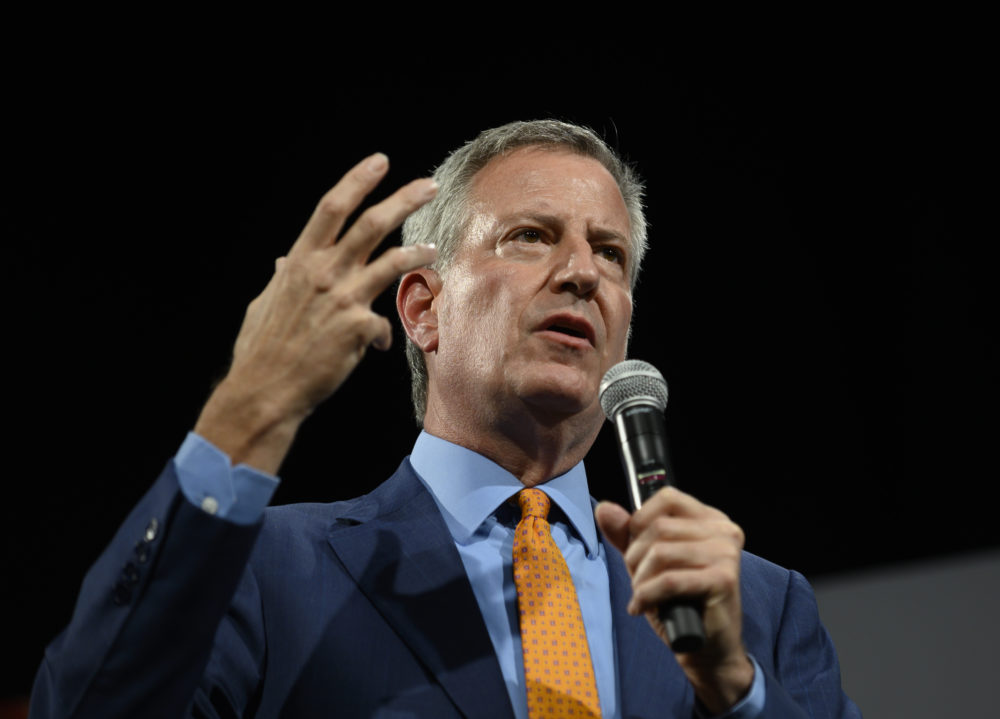Advertisement
Who's Running For President In 2020?
New York City Mayor Bill de Blasio: America 'Is Not Working For Working People'
Resume
Lower tier presidential candidates are facing a tough climb to qualify for the September Democratic debate.
Among them is New York City Mayor Bill de Blasio.
De Blasio is billed as a progressive who supports “Medicare for All,” but so are frontrunners Elizabeth Warren and Bernie Sanders. He says he’s also proud of his mixed race family, however, there are candidates of color running for the nomination.
So why is he running for president? De Blasio says he is campaigning for the Democratic presidential nomination on his record of decreasing inequality in New York City, by instituting free pre-K education for all children and a $15 minimum wage.
“It's about the need to change this country urgently. America right now is not working for working people,” de Blasio says. “These are real life things that are making a huge difference for millions of people. I've been able to do them in a really tough environment and that's why I'm running.”
De Blasio says he will be the one to defeat President Trump because he is “speaking out for working people.
“[Trump] lied to working people, and that’s his Achilles' heel,” de Blasio says.
Interview Highlights
On how his policies decreased inequality in New York City
“Hundreds of thousands of folks already have been lifted out of poverty because of the things we've done to fight inequality, because of that $15 minimum wage, because of affordable housing programs. Let me tell you rent regulation, rent control — it works. And I'm glad we strengthened the laws. We did a rent freeze for two years in New York City because we had those laws and that helped immensely. We have finally gotten real progress in reducing our shelter population. So if you were to ask a lot of my colleagues in this presidential primary for their version of what they have done, some of them have had an opportunity to run something, but obviously not on this scale, by and large. So I think that's why when voters are looking for proof of who someone is, what they're about, I got a lot to show here that I think could really, really help us change this country.”
On the Eric Garner case and police reform
“We've changed the entire nature of policing in the nation's biggest city. … Literally teaching de-escalation training to every single police officer. Now if you say, 'Well, OK what about what happened here? Why was there a delay?' There was a delay because the United States Department of Justice told us not to act on our own disciplinary hearing. They told us they would take the lead. They failed to do so. But look in the end, the biggest thing here is justice was served and where was it served? Within the NYPD. And that shows progress and reform unto itself. This case now, there was one case in addition to Pantaleo, and that is the end of this whole process because all other statute of limitation issues have run and this is the end of it. But what we have to do going forward is the much more crucial thing just continue to deepen reform here and everywhere, and it can be done.”
On how to improve mental health care among veterans
“The folks who come back from war come back carrying a lot. In my dad's case, it was PTSD. He had been in one of the worst battles in history on Okinawa and lost half a leg to a grenade. And the emotional toll — I saw it as a young child — it got worse each year. He would push away help and then he was gone. And you know, he might have lived if he could just accept the help, and we've got today in America, we're losing folks who have served us because they still feel like there's something, there's some shame in asking for help. We all have to fix that. The government has to fix it with making mental health care just as accessible as physical health care. But we all have to speak up and say, 'There's a mental health challenge. There is nothing wrong with it. Just come forward and let's get the help people need. It's there.' ”
On the backlash he has faced from New Yorkers
“Well I'm gonna just tell you a different story that I think has some truth. There's a difference between sort of the public discourse and then what people are actually living. I have young people come up to me all the time, young men of color, and say, 'Thank you. I'm not stopped all the time by police.' I have folks come up all the time and say, 'Pre-K's changed my family's life. We never would've gotten early child education for our kid. We couldn't have afforded it.' The dialogue among the folks who like to comment, you know, that's one thing. But if you go to everyday working people in this city, I think you'll find something very very different.”
Jill Ryan produced and edited this interview for broadcast with Tinku Ray. Samantha Raphelson adapted it for the web.
This segment aired on August 27, 2019.
